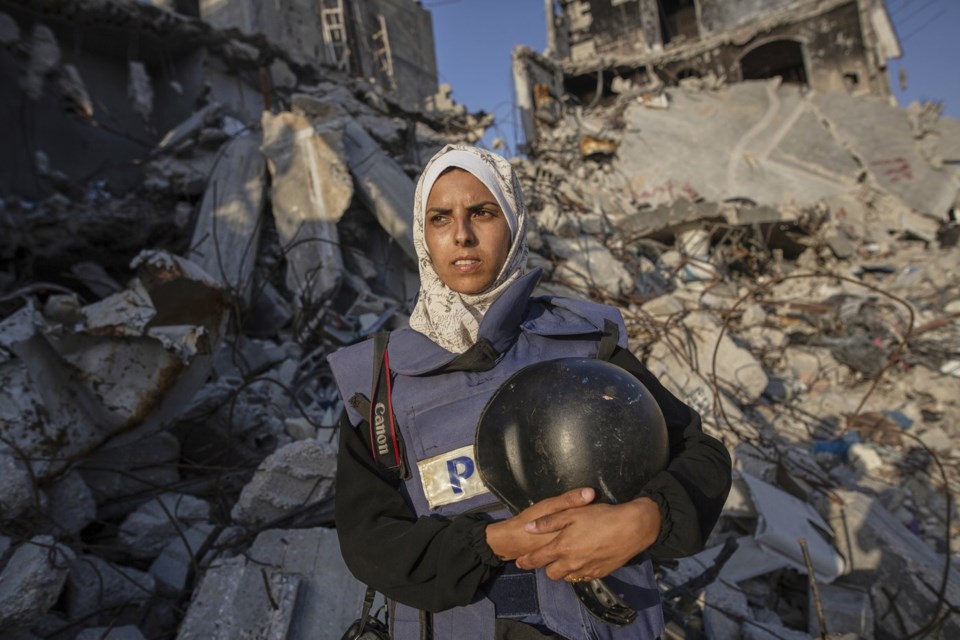Mariam Dagga, a visual journalist who freelanced for The Associated Press and other news organizations and produced harrowing images of the war in Gaza, was killed Monday by an Israeli strike on a hospital. She was 33.
Through photographs and video, Dagga captured the lives of ordinary Palestinians facing extraordinary challenges: families displaced from homes, people crowding around aid trucks, mourners attending funerals and doctors treating wounded or malnourished children.
During the war, Dagga regularly based herself at Nasser Hospital in Khan Younis. She was among 20 people, including five journalists, killed there Monday by Israeli strikes, according to health officials and news organizations.
“She worked under incredibly difficult circumstances to bring stories from Gaza to the world, particularly coverage of the war’s impact on children," said Julie Pace, AP’s Executive Editor and Senior Vice President. "We are devastated by her death and urgently seeking more clarity on the strike.”
The Israel-Hamas war has been one of the deadliest conflicts for media workers, with at least 189 Palestinian journalists killed by Israeli fire in Gaza in the 22-month conflict, according to the Committee to Protect Journalists. Comparatively, 18 journalists have been killed so far in Russia’s war in Ukraine, according to the CPJ.
In an April interview with Eye on Palestine — a social media platform — Dagga appealed to the international community to protect journalists in Gaza and to help end the war. In a video message Sunday, one of her last social media posts, she warned that nowhere in Gaza was safe.
“Every place is dangerous, is hit by airstrikes ... In every home there is a story. In every home there is a detainee. In every home there is suffering.”
Born in Khan Younis, Dagga studied journalism and graduated from the Al-Aqsa University in Gaza. She began working as a journalist in 2015, and was among the few women visual journalists covering the war in Gaza.
She is survived by a 13-year-old son who moved at the start of the war to the United Arab Emirates to live with his father.
When she wasn't working, she was often on the phone with her son, who wanted to return to Khan Younis to be with her, she told colleagues. In her will, which Dagga had shared with a friend, she addressed her son directly: “Never forget me and remember that your mother did everything she could to make you happy, comfortable, and at ease.”
At her funeral Monday, relatives and colleagues caressed her cheeks through tears. Her body lay shrouded in white, a single red flower placed gently beside her face.
Before the war, she had given a kidney to her father, according to her sister, Nada Dagga.
Displaced from home, she was forced to move multiple times during the war, but she never stopped working.
“She was always ready,” said AP reporter Sarah El Deeb, who is based in Beirut. “Dagga stayed close to Nasser hospital and was able to see through the cruelty of the war with the skills and patience to report on its cost to the people of Gaza, its doctors, children and mothers,” she said.
For her recent coverage of malnourished children in Gaza, Dagga won an internal AP award recognizing the strongest work produced each week.
Dagga's editor at the Independent Arabia media outlet, Adhwan Alahmari, said she was among the most ethical, dedicated reporters and photographers. He called the strike a “flagrant violation of international laws.''
Wafaa Shurafa, AP’s senior producer in Gaza who worked with Dagga daily, said she never hesitated to help anyone. Dagga never complained despite the severe hardships she faced, was always quick with a laugh, and was deeply respected and loved by her colleagues, friends and family, Shurafa said.
Shurafa said that she missed a call from Dagga after the first strike hit the hospital on Monday. When she called back, Dagga didn't answer.
“I was nervous at first because she didn’t answer, I was super worried, I thought she was filming, but I never imagined she was killed," she said.
“She didn’t answer, and she never will again.”
___
This story has been corrected to reflect that at least 189 journalists have been killed in Gaza during the 22-month Israel-Hamas war.
___
Magdy reported from Cairo, Mednick reported from Tel Aviv, Israel. Brian Melley in London contributed to this story.
Sam Mednick And Samy Magdy, The Associated Press




